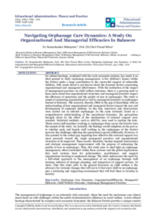Its cultural heritage, combined with the socio-economic mixture, has made it an ideal ground to study orphanage management. A few children's homes within the district make a large contribution to the successful support of vulnerable children. Still, much detail is not known about the dynamic factors concerning organizational and managerial effectiveness. With the realization of the impact of management practices on child welfare outcomes, there is a growing need to learn more about how organizational structures and managerial practices impact the efficiency of operations and the quality of care in orphanages.
The study is aimed at examining organizational as well as managerial practices in orphanages located at Balasore. The research, thereby, filled in the gap of knowledge with an understanding of how organizational and managerial factors impact the care and development of orphaned children. In this line, interviews and observations were carried out in selected orphanages. In the same rationale, based on a comprehensive understanding of the operational dynamics, the perceptions brought about by the effect of the mechanisms of external support were revealed. Statistical methods, such as ANOVA, were used to analyze the data. Thirty-seven staff members working at orphanages from across the district were the sample of the study. So, basically, the findings would enlighten on the part as to whether male and female staff working in the orphanages of the district perceive the challenges affecting the operational capacity differently.
However, it also pointed to the critical gap regarding how effective this external support was more precisely toward the single managerial practices and organizational structures to be improved. These results, therefore, beckon targeted intervention and strategic management improvement with the purpose of enhancing the quality of care in orphanages. Thus, this study aims to shed light on orphanage management, often overlooked within these systems and the global implications that such systems have for policymakers, practitioners, and support organizations desiring to implement change.
The study underscores the need for a full-orbed approach to the management of an orphanage through staff training, infusion of strategic planning, and integration of support services. In short, what this study adds to the general discourse on child welfare is the advocacy for systemic changes that will see to it that every child in an orphanage gets a nurturing and supporting environment that will lead them to develop in entirety.

